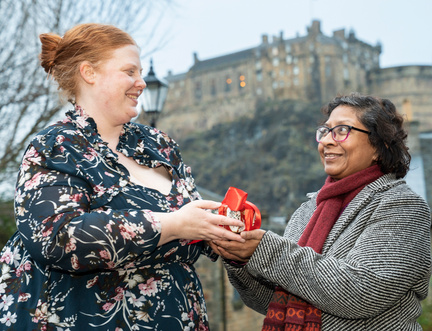More articles Monday 29 August 2016 6:00pm
Gordon Brown Argues We're Better Together

At his event today, the former prime minister Gordon Brown argued, post Brexit, We're Better Together.
“It was the biggest rebellion against the establishment view that we have seen in Britain in a century.” So former Prime Minister Gordon Brown has characterised the vote for Brexit, in an address to the Book Festival. And although he noted his own determination to be “positive”, Brown allowed himself a small dig. “The reaction of the Conservative establishment was predictable: to award themselves honours for failure. And these same politicians wonder why people are cynical about politics…”
Brown located Brexit within a rejection of mainstream parties and political attitudes that has lately taken hold across the world – the downside, he argued, of globalisation. “Globalisation creates huge opportunities but massive insecurities,” he said. “It creates millions of winners but also millions of losers. And that creates a reaction: the resurgence of a need to belong.” The challenge going forward, in his view, is “how do we reconcile the desire for autonomy with the need to co-operate to get things done?”
Of course, one of the chief proponents of a No vote in the Scottish independence referendum wasn’t just talking about co-operation with the European Union. Brown was here to reassert his message to Scots that independence, even with the new spur of Brexit, is a false promise. “We’ve got to judge it by the issues that are most important to us. Mrs Sturgeon’s tests are far too narrow,” he said, listing jobs, public services, inequality, civil rights and defence as issues critically affected by the dismantling of the Union. If two hundred and fifty thousand Scottish jobs are linked to membership of the EU, he said, around one million are directly linked to membership of the United Kingdom – making any SNP case to take Scotland out of the UK in order to keep it in the EU a false economy.
Brown’s own argument is in favour of “a more federal arrangement between Scotland and the United Kingdom.” Scotland should, he said, have its own control over agriculture and fisheries, regulatory policy and human rights. “There is no reasons Scotland shouldn’t legislate on employment rights and no reason it shouldn’t legislate on domestic, civil and human rights. He also proposed that there may be “a case for signing separate international treaties on matters that are devolved.” Chiefly, however, the message was a familiar one, albeit with new inflections: Better Together. Not that he used those words – “We need new thinking, not tired old slogans,” was the refrain.
A national conversation on the constitution, on the roles of the nations and regions and on the implications of Brexit was required, he said. And a second referendum was not the answer to Scottish people’s dissatisfaction, on Brexit or on anything else. “I think the solutions I’m proposing can avoid that. I’ve never been convinced that everyone who voted Yes wanted independence in the way the SNP see it. A credible alternative could achieve 70 to 80% support.” He listed areas in which he feels the independence lobby has insufficient answers: currency; pensions; open borders; and a £15bn fiscal gap - “big enough to double the levels of income tax if you want to maintain the same level of services.”
A second referendum on Brexit was not to be held out for either, in Brown’s view. “I think you’ve got to honour the decision and do your best by it. My view would have been not to have a referendum,” Brown said. “It was purely to solve an internal problem in the Conservative party. I am still passionately pro-EU and I would still like us to be in the EU – but I am a democrat and I accept the result.” Experience helps, he suggested: “I’ve had to accept with a lot of humility a lot of times that I’ve lost the argument.”
A question on the condition and leadership of his own party yielded no specifics on his feelings regarding either Jeremy Corbyn or Owen Smith, but Brown did contend that “You can’t have power without principles – but you can’t deliver your principles without being in power.”
- 2025 Festival:
- 9-24 August
Latest News
 Communities Programme participants celebrate success of 2024
Communities Programme participants celebrate success of 2024



